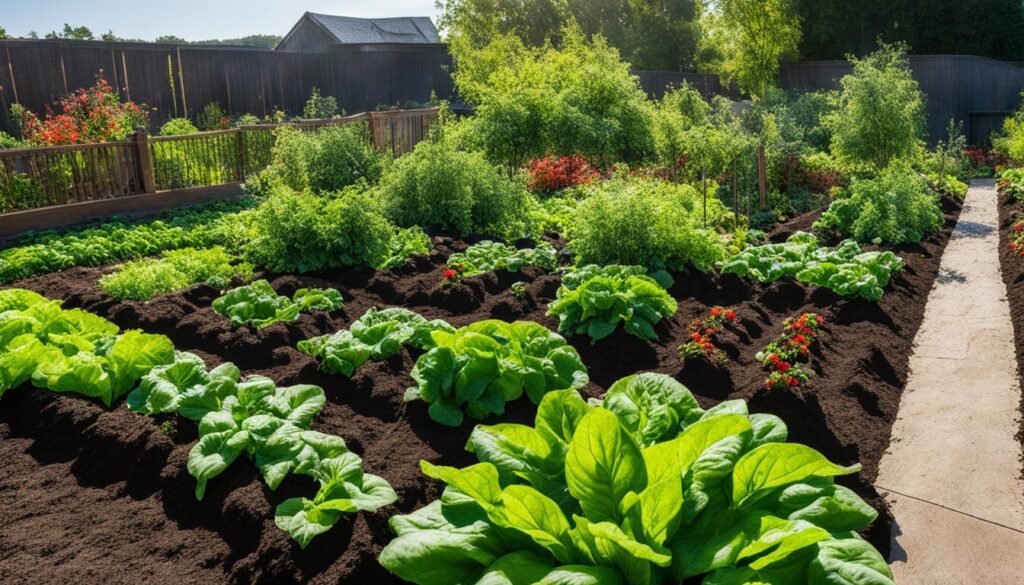When it comes to mulching your vegetable garden, choosing the right type of mulch can significantly impact the growth and fertility of your plants. The proper mulch not only helps retain moisture and suppress weeds but also adds essential nutrients to the soil. In this article, we will explore the best mulch options for your vegetable garden, based on expert recommendations and factual data from reliable sources.
The Benefits of Mulching Your Vegetable Garden
Mulching your vegetable garden offers numerous benefits. Mulching helps suppress weeds, prevent soil compaction and erosion, retain moisture, and create a barrier between plants and pathogens in the soil.
Mulch also improves soil structure, provides insulation for plant roots, and adds organic matter and nutrients to the soil as it breaks down. By choosing the right mulch for your vegetable garden, you can elevate the health and productivity of your plants.
Take a look at the image below to see how mulching can benefit your vegetable garden:
When you mulch your vegetable garden, you create a protective layer on the soil surface. This layer acts as a barrier, preventing weed seeds from germinating and competing with your plants for nutrients and water. By reducing weed growth, mulching simplifies garden maintenance and keeps your vegetables healthy.
In addition, mulching helps to prevent soil compaction and erosion. It acts as a cushion, softening the impact of heavy rain and preventing soil from being washed away. This is especially important for vegetable gardens as compacted soil can hinder root development and make it harder for plants to absorb water and nutrients.
Retaining moisture is another key benefit of mulching. By covering the soil with mulch, you reduce evaporation and keep the moisture level consistent. This is especially crucial during hot summer months when plants are more susceptible to drought. Mulch also helps to regulate soil temperature, keeping it cooler in the summer and warmer in the winter.
Furthermore, mulch creates a physical barrier between plants and pathogens in the soil. It prevents soil-borne diseases from splashing onto the leaves and stems of your vegetables, reducing the risk of infection and promoting healthy growth.
The organic matter in mulch improves soil structure, making it more crumbly and well-draining. This allows plant roots to penetrate the soil easily and access water and nutrients. As mulch breaks down over time, it releases valuable organic matter and nutrients into the soil, enriching it and promoting a thriving ecosystem for your vegetables to grow in.
In conclusion, mulching your vegetable garden brings a host of benefits. By suppressing weeds, preventing soil compaction and erosion, retaining moisture, and improving soil structure, mulch plays a vital role in promoting healthy and productive plants. Choose the right mulch for your vegetable garden to create a nurturing environment that maximizes growth and yields.
Top Mulch Options for Vegetable Gardens
When it comes to mulching your vegetable garden, there are several natural mulch options that are highly recommended. Each type of mulch has its own unique qualities that make it suitable for vegetable gardens.
Straw: Straw is a lightweight and easy-to-spread mulch option. It helps retain moisture in the soil and suppresses weed growth.
Pine Bark: Pine bark mulch breaks down over time, improving the soil as it decomposes. It adds valuable organic matter and helps regulate soil temperature.
Arborist Wood Chips: Arborist wood chips are often available for free and are an excellent choice for improving soil quality. They help with moisture retention, weed control, and provide a steady release of nutrients as they break down.
Shredded Leaves: Shredded leaves are readily available and nutrient-rich. They not only act as a mulch but also contribute to the enrichment of the soil as they decompose.
Grass Clippings: Grass clippings are a free and readily available mulch option. They are high in nitrogen and can help provide the necessary nutrients for healthy plant growth.
Pine Needles: Pine needles are an ideal mulch option for acid-loving plants such as blueberries or azaleas. They also provide good weed suppression and moisture retention.
Consider the specific needs of your vegetable garden and choose the mulch option that aligns with those requirements. Experiment with different types of mulch to find the one that works best for you and your plants.
Using Compost as Mulch in Vegetable Gardens
Compost is a versatile and beneficial substance that serves not only as a soil amendment but also as an excellent mulch for your vegetable garden. When used as mulch, compost offers a multitude of advantages that can enhance the health and productivity of your plants.
One of the key benefits of using compost as mulch is its ability to improve soil quality and structure. Compost contains organic matter that helps loosen compacted soil and promotes better drainage and aeration. By applying compost as mulch, you create an environment that allows plant roots to penetrate the soil more easily, ensuring optimal nutrient uptake and water retention.
Additionally, compost acts as a slow-release fertilizer, providing essential nutrients to your plants throughout the growing season. It contains a wide range of macro and micronutrients that promote healthy growth and development. The nutrients in compost are released gradually, ensuring a steady supply for your plants without the risk of nutrient leaching.
Furthermore, using compost as mulch stimulates the activity of beneficial microorganisms in the soil. These microorganisms contribute to the breakdown of organic matter, releasing nutrients that are readily available to plants. They also help suppress harmful pathogens and pests, creating a healthier and more resilient ecosystem in your vegetable garden.
Composting your own kitchen scraps and yard waste is a cost-effective and sustainable way to produce compost for your vegetable garden. By recycling organic materials, you reduce waste and create a nutrient-rich resource for your plants. Making compost at home is relatively simple, and there are many resources available that can guide you through the process.
To use compost as mulch, apply a layer of compost around your vegetable plants, taking care to avoid direct contact with the stems. A thickness of 2-3 inches is generally recommended. As the compost breaks down, it enriches the soil, promotes nutrient cycling, and supports a healthy ecosystem in your vegetable garden.
In conclusion, using compost as mulch in your vegetable garden is a sustainable and effective way to improve soil quality, provide nutrients to your plants, and enhance beneficial microbial activity. By harnessing the power of compost, you can create a thriving environment for your vegetable plants and enjoy a bountiful harvest.
Mulching with Leaves and Grass Clippings
When it comes to mulching your vegetable garden, leaves and grass clippings can be cost-effective and sustainable options. Let’s explore how you can use these readily available materials to improve your garden’s health and productivity.
Shredded leaves are an excellent source of mulch for your vegetable garden. Not only do they provide a protective layer, but they also possess rich nutrients that benefit plant growth. In addition, shredded leaves improve the soil structure, allowing for better water drainage and root development. You can collect leaves in the fall, shred them using a mulching mower or a leaf shredder, and store them for the following growing season.
Grass clippings, when dry and disease-free, can be a valuable mulch source that adds nitrogen to the soil. Their high nitrogen content helps nourish your plants and promotes healthy growth. By applying a layer of grass clippings over your garden beds, you can suppress weeds and conserve moisture, creating a favorable environment for your vegetables to thrive.
To use leaves and grass clippings as mulch, spread a thin layer (2 to 3 inches) around your vegetable plants, leaving a gap around the stem to prevent rot. Avoid piling mulch against the plant stems, as this can encourage pests and diseases. Monitor the moisture levels and adjust the mulch thickness accordingly.
To obtain the optimal benefits from leaf mulch for vegetable gardens and grass clippings as mulch, it’s crucial to gather them from chemical-free sources. Avoid using grass clippings from lawns treated with herbicides or leaves from trees sprayed with pesticides.
By utilizing leaves and grass clippings as mulch, you can nourish your vegetable garden, promote healthy growth, and reduce waste. It’s an eco-friendly approach that benefits both your plants and the environment.
How Can Mulching Lawn Mowers Benefit Vegetable Gardens?
When it comes to maintaining a healthy vegetable garden, the use of the best mulching lawn mowers can offer numerous benefits. Mulching helps to retain moisture in the soil, suppresses weed growth, and adds nutrients back into the ground as the mulch decomposes, promoting healthier vegetable growth overall.
Conclusion
Mulching is an essential practice for maintaining a healthy and productive vegetable garden. By carefully selecting the right mulch for your specific needs, you can improve soil fertility, prevent weed growth, retain moisture, and promote optimal plant growth and yield.
When choosing the right mulch for your vegetable garden, consider the unique qualities of each option. Straw, pine bark, arborist wood chips, shredded leaves, grass clippings, and pine needles all have their advantages and suitability for different plants and growing conditions.
It is recommended to experiment with various mulches to find the one that works best for your vegetable garden. You can mix and match different types of mulch or even use compost as a mulching option. By understanding your garden’s specific requirements and applying proper mulching techniques, you can create an ideal environment for your plants to thrive, resulting in bountiful harvests year after year.










